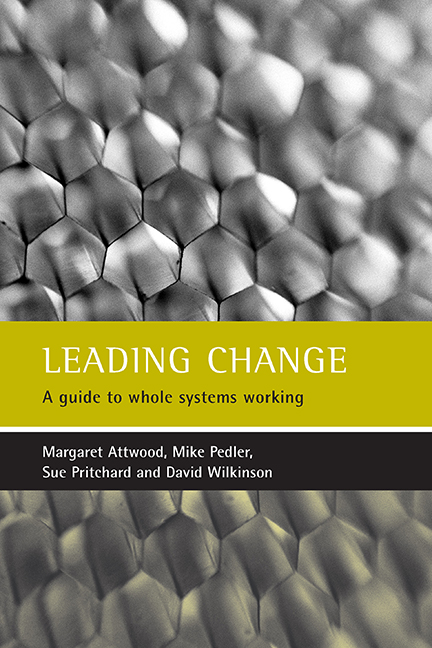Book contents
- Frontmatter
- Contents
- Foreword
- Foreword
- Prologue
- one Why do we need whole systems change?
- Two How Do We Put These Fine Words Intoaction? An Overview of Whole Systems Development
- Three The emerging practice of wholesystems development
- Four Leadership: keeping the big picture in view
- Five Public learning
- Six Valuing difference and diversity: getting the whole systeminto the room
- Seven Meeting differently: large and small group working
- Eight Follow-through and sticking with it
- Nine From organisations to networks
- Ten Confirming cases: local problems andlocal solutions within whole systems
- Epilogue
- Bibliography
- Index
Two - How Do We Put These Fine Words Intoaction? An Overview of Whole Systems Development
Published online by Cambridge University Press: 20 January 2022
- Frontmatter
- Contents
- Foreword
- Foreword
- Prologue
- one Why do we need whole systems change?
- Two How Do We Put These Fine Words Intoaction? An Overview of Whole Systems Development
- Three The emerging practice of wholesystems development
- Four Leadership: keeping the big picture in view
- Five Public learning
- Six Valuing difference and diversity: getting the whole systeminto the room
- Seven Meeting differently: large and small group working
- Eight Follow-through and sticking with it
- Nine From organisations to networks
- Ten Confirming cases: local problems andlocal solutions within whole systems
- Epilogue
- Bibliography
- Index
Summary
Business is 5% strategy, 95% implementation.
As emphasised in Chapter One, it is implementation, and not vision or strategy, that is the biggest challenge for leaders seeking to bring about change. Whole systems development is a set of propositions, tools and practices that aims to engage all the people in the system in designing and implementing change. There is nothing magical or mysterious about this. Sustainable change, in contrast to that which is temporary and superficial, is only brought about by involving all those who are part of the problem in creating and implementingthe solutions.
In this chapter we:
•outline our practice of whole systems development at the three levels ofphilosophy, operating principles and processes;
•emphasise the importance of a pragmatic approach to change, action andlearning
•develop some principles for the whole systems way of working;
•explain how these are underpinned by five working processes, which weterm the Five Keys of whole systems development.
Philosophies – useful action and learning in the context ofthe whole system
Our standpoint is a pragmatic one: what works best in helping people bring about the changes they seek. As a philosophical movement, pragmatism flourished in the later 19th and early 20th century and is associated with people like Charles Peirce, William James, John Dewey and George Herbert Mead. Like many philosophers before them, pragmatists sought to unite reason and values, and their particular contribution was to ally scientific knowledge and the ideals of human conduct in an era characterised by rapid social and intellectual change. This led them to focus on the possibilities for, and the consequences of, human action in a changing world. They emphasised the need for experiment, reflection and learning in working out what is most useful for us, what works best.
William James tells a story that illustrates this position. While camping in the mountains with friends, James returned from a solitary walk to find them engaged in a furious metaphysical dispute:
The corpus of the dispute was a squirrel – a live squirrel supposed to be clinging to one side of a tree trunk; while over against the tree’s opposite side a human being was imagined to stand. This human witness tries to get sight of the squirrel by moving rapidly round the tree, but no matter how fast he goes, the squirrel moves as fast in the opposite direction, and always keeps the tree between himself and the man, so that never a glimpse of him is caught.
- Type
- Chapter
- Information
- Leading ChangeA Guide to Whole Systems Working, pp. 19 - 38Publisher: Bristol University PressPrint publication year: 2003



